Entrepreneurship and Small Business Management
VerifiedAdded on 2023/06/14
|18
|4996
|449
AI Summary
This report explores different types of entrepreneurial ventures and their link with typology of entrepreneurship. It also highlights the impact of micro and small businesses on the economy and social economy. The report delves into the entrepreneurial mindset and provides examples of specified entrepreneurs.
Contribute Materials
Your contribution can guide someone’s learning journey. Share your
documents today.

Entrepreneurship and
Small Business
Management
Small Business
Management
Secure Best Marks with AI Grader
Need help grading? Try our AI Grader for instant feedback on your assignments.
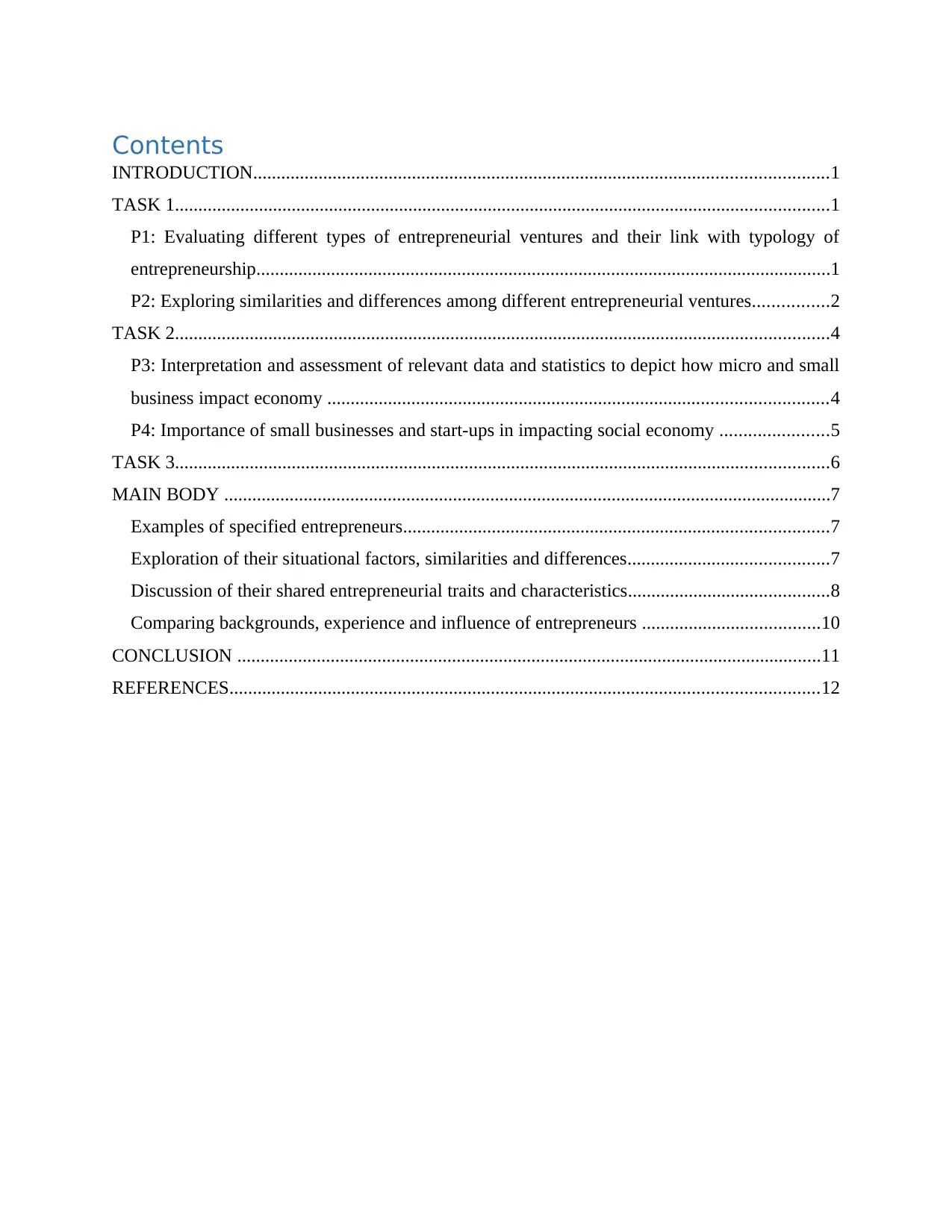
Contents
INTRODUCTION...........................................................................................................................1
TASK 1............................................................................................................................................1
P1: Evaluating different types of entrepreneurial ventures and their link with typology of
entrepreneurship...........................................................................................................................1
P2: Exploring similarities and differences among different entrepreneurial ventures................2
TASK 2............................................................................................................................................4
P3: Interpretation and assessment of relevant data and statistics to depict how micro and small
business impact economy ...........................................................................................................4
P4: Importance of small businesses and start-ups in impacting social economy .......................5
TASK 3............................................................................................................................................6
MAIN BODY ..................................................................................................................................7
Examples of specified entrepreneurs...........................................................................................7
Exploration of their situational factors, similarities and differences...........................................7
Discussion of their shared entrepreneurial traits and characteristics...........................................8
Comparing backgrounds, experience and influence of entrepreneurs ......................................10
CONCLUSION .............................................................................................................................11
REFERENCES..............................................................................................................................12
INTRODUCTION...........................................................................................................................1
TASK 1............................................................................................................................................1
P1: Evaluating different types of entrepreneurial ventures and their link with typology of
entrepreneurship...........................................................................................................................1
P2: Exploring similarities and differences among different entrepreneurial ventures................2
TASK 2............................................................................................................................................4
P3: Interpretation and assessment of relevant data and statistics to depict how micro and small
business impact economy ...........................................................................................................4
P4: Importance of small businesses and start-ups in impacting social economy .......................5
TASK 3............................................................................................................................................6
MAIN BODY ..................................................................................................................................7
Examples of specified entrepreneurs...........................................................................................7
Exploration of their situational factors, similarities and differences...........................................7
Discussion of their shared entrepreneurial traits and characteristics...........................................8
Comparing backgrounds, experience and influence of entrepreneurs ......................................10
CONCLUSION .............................................................................................................................11
REFERENCES..............................................................................................................................12

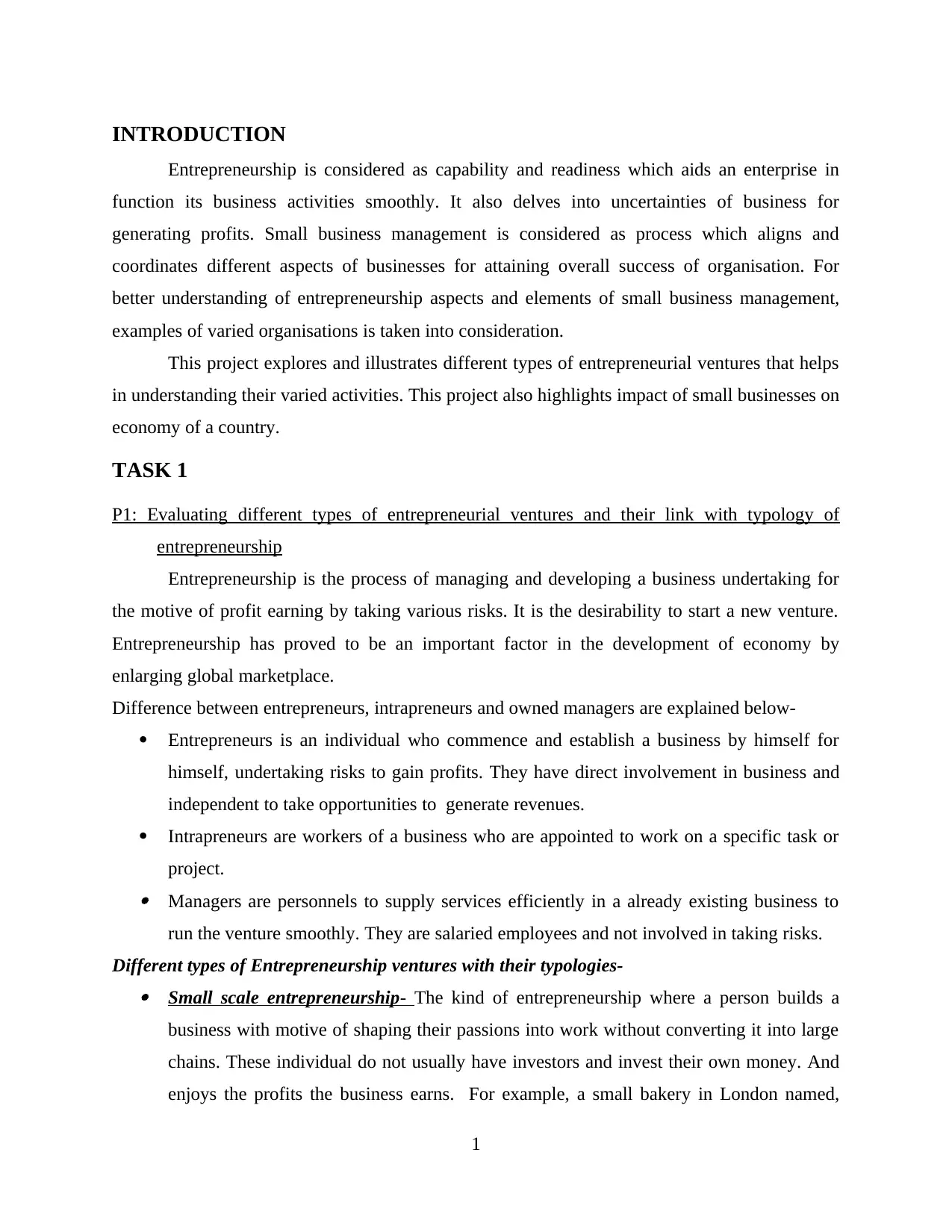
INTRODUCTION
Entrepreneurship is considered as capability and readiness which aids an enterprise in
function its business activities smoothly. It also delves into uncertainties of business for
generating profits. Small business management is considered as process which aligns and
coordinates different aspects of businesses for attaining overall success of organisation. For
better understanding of entrepreneurship aspects and elements of small business management,
examples of varied organisations is taken into consideration.
This project explores and illustrates different types of entrepreneurial ventures that helps
in understanding their varied activities. This project also highlights impact of small businesses on
economy of a country.
TASK 1
P1: Evaluating different types of entrepreneurial ventures and their link with typology of
entrepreneurship
Entrepreneurship is the process of managing and developing a business undertaking for
the motive of profit earning by taking various risks. It is the desirability to start a new venture.
Entrepreneurship has proved to be an important factor in the development of economy by
enlarging global marketplace.
Difference between entrepreneurs, intrapreneurs and owned managers are explained below-
Entrepreneurs is an individual who commence and establish a business by himself for
himself, undertaking risks to gain profits. They have direct involvement in business and
independent to take opportunities to generate revenues.
Intrapreneurs are workers of a business who are appointed to work on a specific task or
project. Managers are personnels to supply services efficiently in a already existing business to
run the venture smoothly. They are salaried employees and not involved in taking risks.
Different types of Entrepreneurship ventures with their typologies- Small scale entrepreneurship- The kind of entrepreneurship where a person builds a
business with motive of shaping their passions into work without converting it into large
chains. These individual do not usually have investors and invest their own money. And
enjoys the profits the business earns. For example, a small bakery in London named,
1
Entrepreneurship is considered as capability and readiness which aids an enterprise in
function its business activities smoothly. It also delves into uncertainties of business for
generating profits. Small business management is considered as process which aligns and
coordinates different aspects of businesses for attaining overall success of organisation. For
better understanding of entrepreneurship aspects and elements of small business management,
examples of varied organisations is taken into consideration.
This project explores and illustrates different types of entrepreneurial ventures that helps
in understanding their varied activities. This project also highlights impact of small businesses on
economy of a country.
TASK 1
P1: Evaluating different types of entrepreneurial ventures and their link with typology of
entrepreneurship
Entrepreneurship is the process of managing and developing a business undertaking for
the motive of profit earning by taking various risks. It is the desirability to start a new venture.
Entrepreneurship has proved to be an important factor in the development of economy by
enlarging global marketplace.
Difference between entrepreneurs, intrapreneurs and owned managers are explained below-
Entrepreneurs is an individual who commence and establish a business by himself for
himself, undertaking risks to gain profits. They have direct involvement in business and
independent to take opportunities to generate revenues.
Intrapreneurs are workers of a business who are appointed to work on a specific task or
project. Managers are personnels to supply services efficiently in a already existing business to
run the venture smoothly. They are salaried employees and not involved in taking risks.
Different types of Entrepreneurship ventures with their typologies- Small scale entrepreneurship- The kind of entrepreneurship where a person builds a
business with motive of shaping their passions into work without converting it into large
chains. These individual do not usually have investors and invest their own money. And
enjoys the profits the business earns. For example, a small bakery in London named,
1
Paraphrase This Document
Need a fresh take? Get an instant paraphrase of this document with our AI Paraphraser
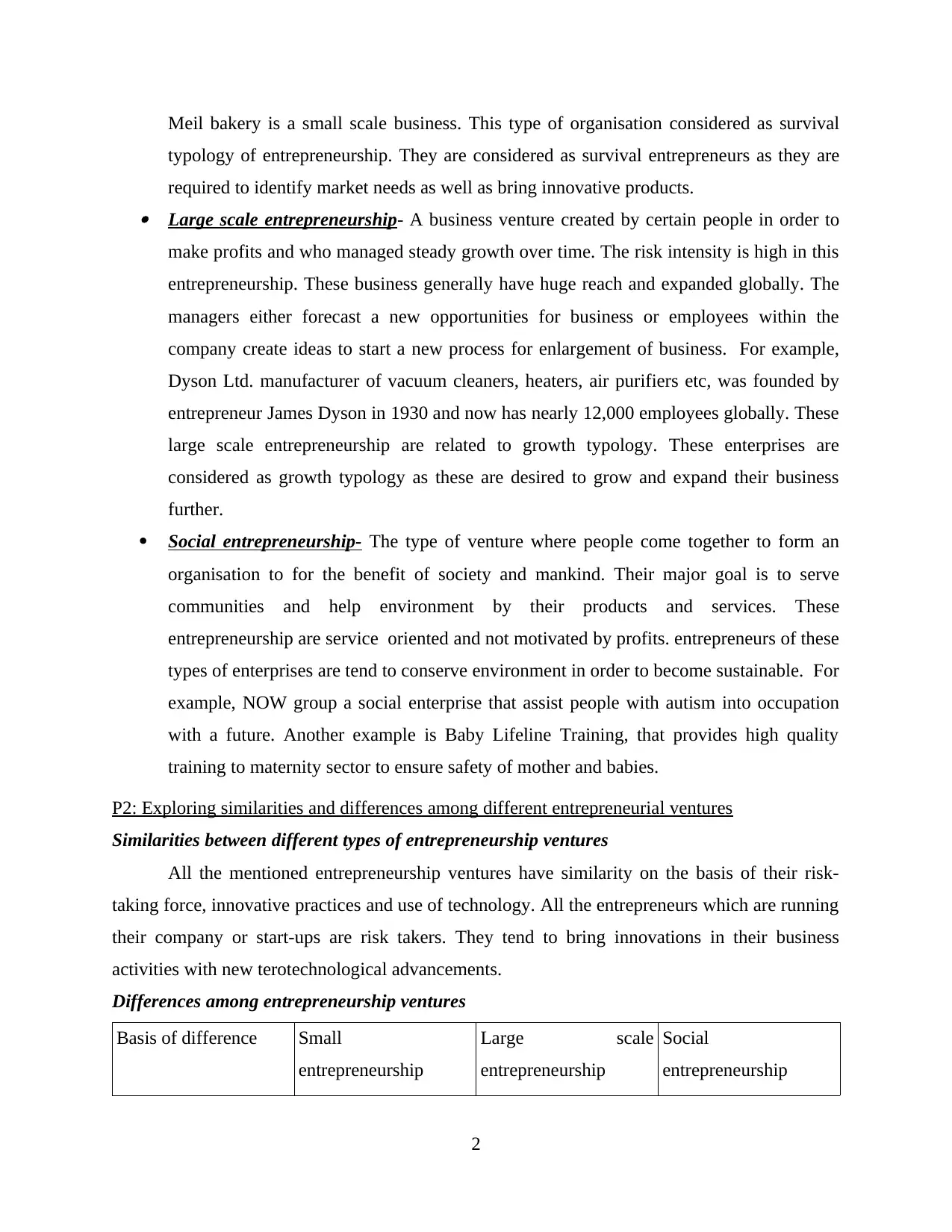
Meil bakery is a small scale business. This type of organisation considered as survival
typology of entrepreneurship. They are considered as survival entrepreneurs as they are
required to identify market needs as well as bring innovative products. Large scale entrepreneurship- A business venture created by certain people in order to
make profits and who managed steady growth over time. The risk intensity is high in this
entrepreneurship. These business generally have huge reach and expanded globally. The
managers either forecast a new opportunities for business or employees within the
company create ideas to start a new process for enlargement of business. For example,
Dyson Ltd. manufacturer of vacuum cleaners, heaters, air purifiers etc, was founded by
entrepreneur James Dyson in 1930 and now has nearly 12,000 employees globally. These
large scale entrepreneurship are related to growth typology. These enterprises are
considered as growth typology as these are desired to grow and expand their business
further.
Social entrepreneurship- The type of venture where people come together to form an
organisation to for the benefit of society and mankind. Their major goal is to serve
communities and help environment by their products and services. These
entrepreneurship are service oriented and not motivated by profits. entrepreneurs of these
types of enterprises are tend to conserve environment in order to become sustainable. For
example, NOW group a social enterprise that assist people with autism into occupation
with a future. Another example is Baby Lifeline Training, that provides high quality
training to maternity sector to ensure safety of mother and babies.
P2: Exploring similarities and differences among different entrepreneurial ventures
Similarities between different types of entrepreneurship ventures
All the mentioned entrepreneurship ventures have similarity on the basis of their risk-
taking force, innovative practices and use of technology. All the entrepreneurs which are running
their company or start-ups are risk takers. They tend to bring innovations in their business
activities with new terotechnological advancements.
Differences among entrepreneurship ventures
Basis of difference Small
entrepreneurship
Large scale
entrepreneurship
Social
entrepreneurship
2
typology of entrepreneurship. They are considered as survival entrepreneurs as they are
required to identify market needs as well as bring innovative products. Large scale entrepreneurship- A business venture created by certain people in order to
make profits and who managed steady growth over time. The risk intensity is high in this
entrepreneurship. These business generally have huge reach and expanded globally. The
managers either forecast a new opportunities for business or employees within the
company create ideas to start a new process for enlargement of business. For example,
Dyson Ltd. manufacturer of vacuum cleaners, heaters, air purifiers etc, was founded by
entrepreneur James Dyson in 1930 and now has nearly 12,000 employees globally. These
large scale entrepreneurship are related to growth typology. These enterprises are
considered as growth typology as these are desired to grow and expand their business
further.
Social entrepreneurship- The type of venture where people come together to form an
organisation to for the benefit of society and mankind. Their major goal is to serve
communities and help environment by their products and services. These
entrepreneurship are service oriented and not motivated by profits. entrepreneurs of these
types of enterprises are tend to conserve environment in order to become sustainable. For
example, NOW group a social enterprise that assist people with autism into occupation
with a future. Another example is Baby Lifeline Training, that provides high quality
training to maternity sector to ensure safety of mother and babies.
P2: Exploring similarities and differences among different entrepreneurial ventures
Similarities between different types of entrepreneurship ventures
All the mentioned entrepreneurship ventures have similarity on the basis of their risk-
taking force, innovative practices and use of technology. All the entrepreneurs which are running
their company or start-ups are risk takers. They tend to bring innovations in their business
activities with new terotechnological advancements.
Differences among entrepreneurship ventures
Basis of difference Small
entrepreneurship
Large scale
entrepreneurship
Social
entrepreneurship
2
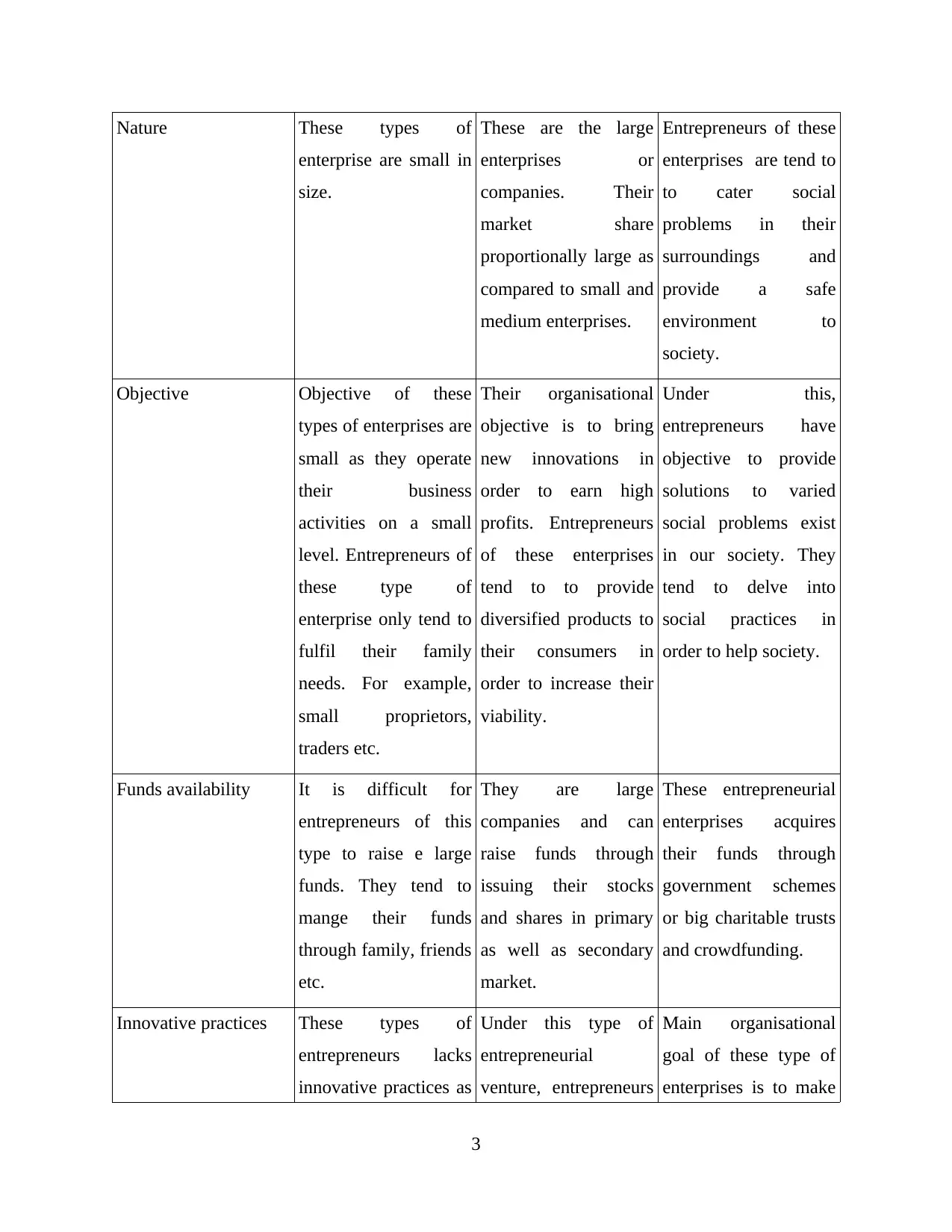
Nature These types of
enterprise are small in
size.
These are the large
enterprises or
companies. Their
market share
proportionally large as
compared to small and
medium enterprises.
Entrepreneurs of these
enterprises are tend to
to cater social
problems in their
surroundings and
provide a safe
environment to
society.
Objective Objective of these
types of enterprises are
small as they operate
their business
activities on a small
level. Entrepreneurs of
these type of
enterprise only tend to
fulfil their family
needs. For example,
small proprietors,
traders etc.
Their organisational
objective is to bring
new innovations in
order to earn high
profits. Entrepreneurs
of these enterprises
tend to to provide
diversified products to
their consumers in
order to increase their
viability.
Under this,
entrepreneurs have
objective to provide
solutions to varied
social problems exist
in our society. They
tend to delve into
social practices in
order to help society.
Funds availability It is difficult for
entrepreneurs of this
type to raise e large
funds. They tend to
mange their funds
through family, friends
etc.
They are large
companies and can
raise funds through
issuing their stocks
and shares in primary
as well as secondary
market.
These entrepreneurial
enterprises acquires
their funds through
government schemes
or big charitable trusts
and crowdfunding.
Innovative practices These types of
entrepreneurs lacks
innovative practices as
Under this type of
entrepreneurial
venture, entrepreneurs
Main organisational
goal of these type of
enterprises is to make
3
enterprise are small in
size.
These are the large
enterprises or
companies. Their
market share
proportionally large as
compared to small and
medium enterprises.
Entrepreneurs of these
enterprises are tend to
to cater social
problems in their
surroundings and
provide a safe
environment to
society.
Objective Objective of these
types of enterprises are
small as they operate
their business
activities on a small
level. Entrepreneurs of
these type of
enterprise only tend to
fulfil their family
needs. For example,
small proprietors,
traders etc.
Their organisational
objective is to bring
new innovations in
order to earn high
profits. Entrepreneurs
of these enterprises
tend to to provide
diversified products to
their consumers in
order to increase their
viability.
Under this,
entrepreneurs have
objective to provide
solutions to varied
social problems exist
in our society. They
tend to delve into
social practices in
order to help society.
Funds availability It is difficult for
entrepreneurs of this
type to raise e large
funds. They tend to
mange their funds
through family, friends
etc.
They are large
companies and can
raise funds through
issuing their stocks
and shares in primary
as well as secondary
market.
These entrepreneurial
enterprises acquires
their funds through
government schemes
or big charitable trusts
and crowdfunding.
Innovative practices These types of
entrepreneurs lacks
innovative practices as
Under this type of
entrepreneurial
venture, entrepreneurs
Main organisational
goal of these type of
enterprises is to make
3
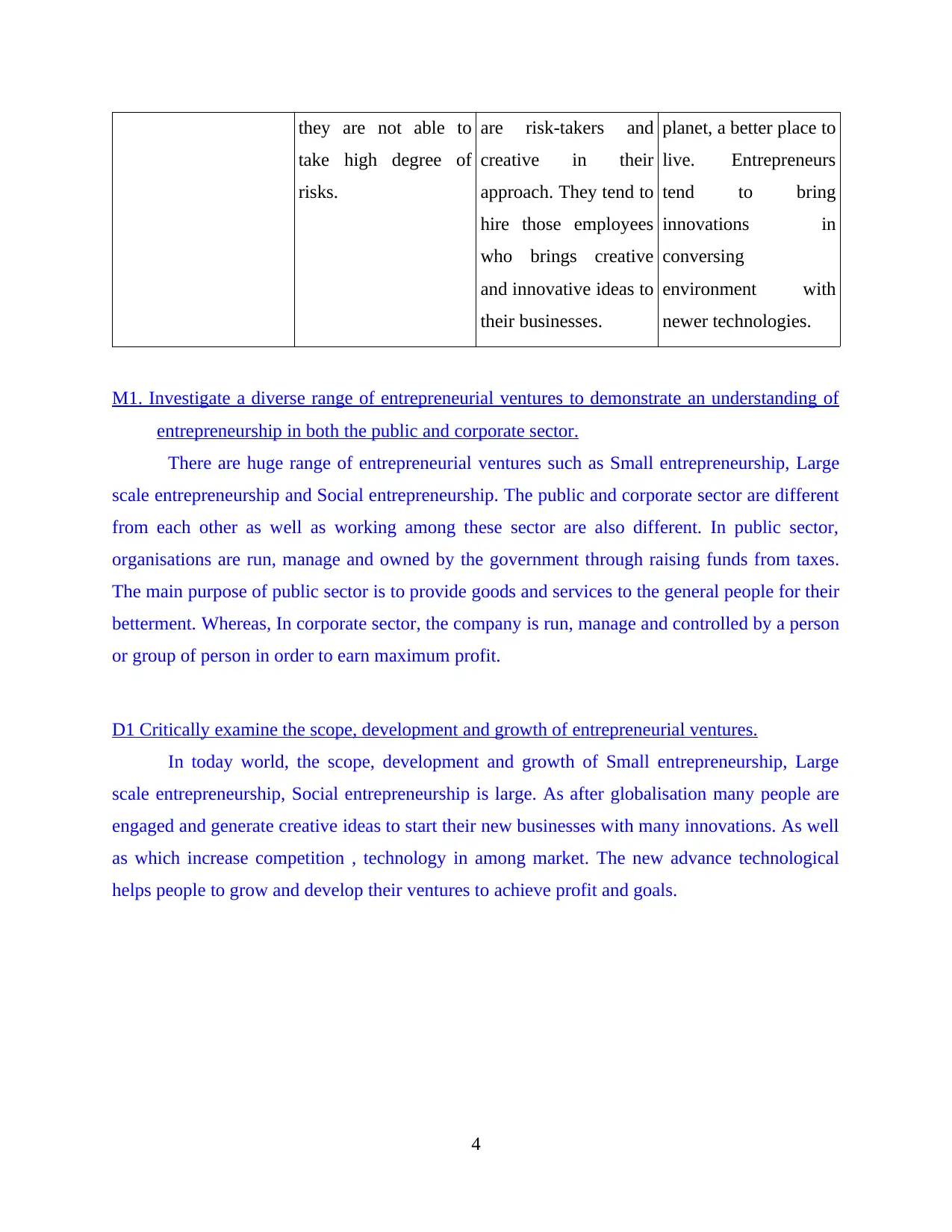
they are not able to
take high degree of
risks.
are risk-takers and
creative in their
approach. They tend to
hire those employees
who brings creative
and innovative ideas to
their businesses.
planet, a better place to
live. Entrepreneurs
tend to bring
innovations in
conversing
environment with
newer technologies.
M1. Investigate a diverse range of entrepreneurial ventures to demonstrate an understanding of
entrepreneurship in both the public and corporate sector.
There are huge range of entrepreneurial ventures such as Small entrepreneurship, Large
scale entrepreneurship and Social entrepreneurship. The public and corporate sector are different
from each other as well as working among these sector are also different. In public sector,
organisations are run, manage and owned by the government through raising funds from taxes.
The main purpose of public sector is to provide goods and services to the general people for their
betterment. Whereas, In corporate sector, the company is run, manage and controlled by a person
or group of person in order to earn maximum profit.
D1 Critically examine the scope, development and growth of entrepreneurial ventures.
In today world, the scope, development and growth of Small entrepreneurship, Large
scale entrepreneurship, Social entrepreneurship is large. As after globalisation many people are
engaged and generate creative ideas to start their new businesses with many innovations. As well
as which increase competition , technology in among market. The new advance technological
helps people to grow and develop their ventures to achieve profit and goals.
4
take high degree of
risks.
are risk-takers and
creative in their
approach. They tend to
hire those employees
who brings creative
and innovative ideas to
their businesses.
planet, a better place to
live. Entrepreneurs
tend to bring
innovations in
conversing
environment with
newer technologies.
M1. Investigate a diverse range of entrepreneurial ventures to demonstrate an understanding of
entrepreneurship in both the public and corporate sector.
There are huge range of entrepreneurial ventures such as Small entrepreneurship, Large
scale entrepreneurship and Social entrepreneurship. The public and corporate sector are different
from each other as well as working among these sector are also different. In public sector,
organisations are run, manage and owned by the government through raising funds from taxes.
The main purpose of public sector is to provide goods and services to the general people for their
betterment. Whereas, In corporate sector, the company is run, manage and controlled by a person
or group of person in order to earn maximum profit.
D1 Critically examine the scope, development and growth of entrepreneurial ventures.
In today world, the scope, development and growth of Small entrepreneurship, Large
scale entrepreneurship, Social entrepreneurship is large. As after globalisation many people are
engaged and generate creative ideas to start their new businesses with many innovations. As well
as which increase competition , technology in among market. The new advance technological
helps people to grow and develop their ventures to achieve profit and goals.
4
Secure Best Marks with AI Grader
Need help grading? Try our AI Grader for instant feedback on your assignments.
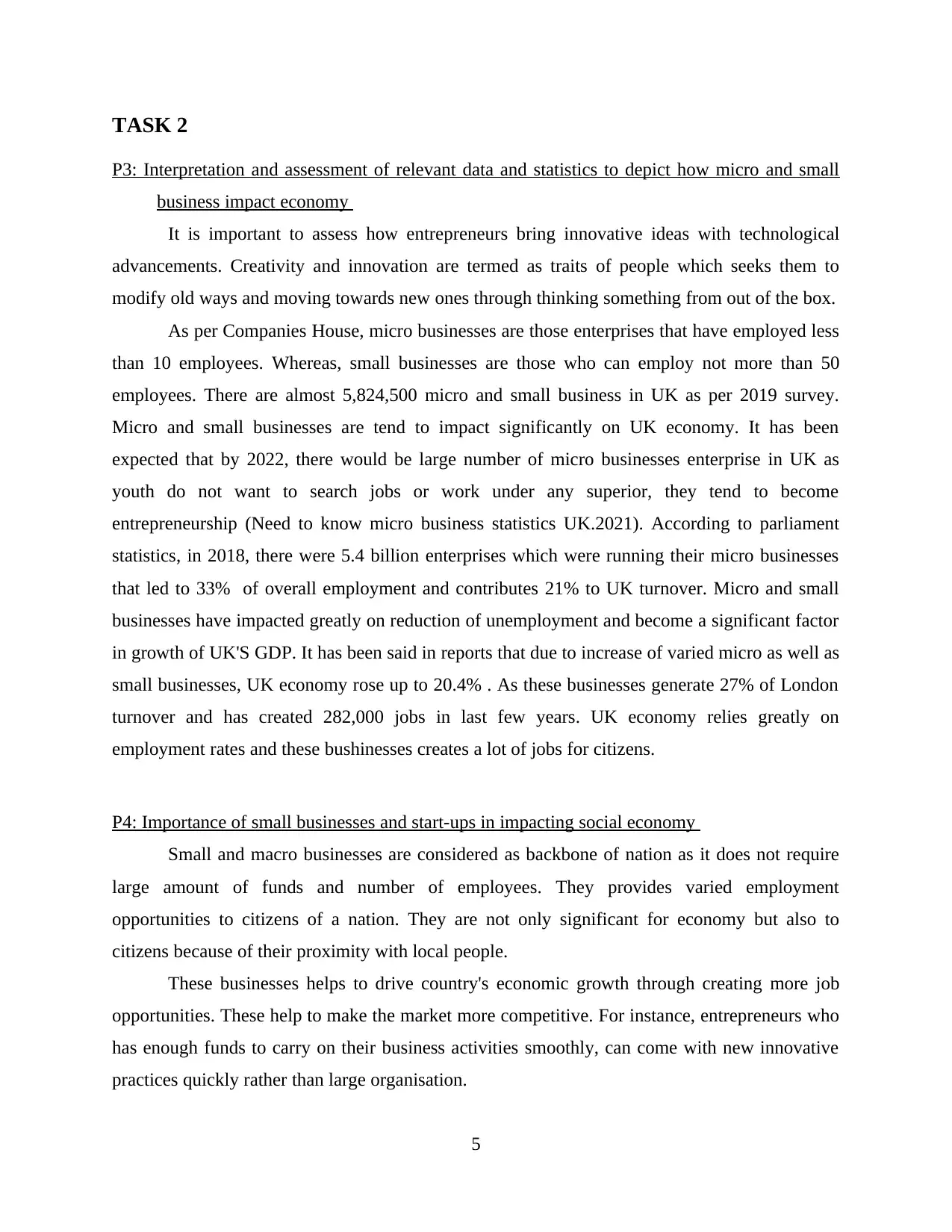
TASK 2
P3: Interpretation and assessment of relevant data and statistics to depict how micro and small
business impact economy
It is important to assess how entrepreneurs bring innovative ideas with technological
advancements. Creativity and innovation are termed as traits of people which seeks them to
modify old ways and moving towards new ones through thinking something from out of the box.
As per Companies House, micro businesses are those enterprises that have employed less
than 10 employees. Whereas, small businesses are those who can employ not more than 50
employees. There are almost 5,824,500 micro and small business in UK as per 2019 survey.
Micro and small businesses are tend to impact significantly on UK economy. It has been
expected that by 2022, there would be large number of micro businesses enterprise in UK as
youth do not want to search jobs or work under any superior, they tend to become
entrepreneurship (Need to know micro business statistics UK.2021). According to parliament
statistics, in 2018, there were 5.4 billion enterprises which were running their micro businesses
that led to 33% of overall employment and contributes 21% to UK turnover. Micro and small
businesses have impacted greatly on reduction of unemployment and become a significant factor
in growth of UK'S GDP. It has been said in reports that due to increase of varied micro as well as
small businesses, UK economy rose up to 20.4% . As these businesses generate 27% of London
turnover and has created 282,000 jobs in last few years. UK economy relies greatly on
employment rates and these bushinesses creates a lot of jobs for citizens.
P4: Importance of small businesses and start-ups in impacting social economy
Small and macro businesses are considered as backbone of nation as it does not require
large amount of funds and number of employees. They provides varied employment
opportunities to citizens of a nation. They are not only significant for economy but also to
citizens because of their proximity with local people.
These businesses helps to drive country's economic growth through creating more job
opportunities. These help to make the market more competitive. For instance, entrepreneurs who
has enough funds to carry on their business activities smoothly, can come with new innovative
practices quickly rather than large organisation.
5
P3: Interpretation and assessment of relevant data and statistics to depict how micro and small
business impact economy
It is important to assess how entrepreneurs bring innovative ideas with technological
advancements. Creativity and innovation are termed as traits of people which seeks them to
modify old ways and moving towards new ones through thinking something from out of the box.
As per Companies House, micro businesses are those enterprises that have employed less
than 10 employees. Whereas, small businesses are those who can employ not more than 50
employees. There are almost 5,824,500 micro and small business in UK as per 2019 survey.
Micro and small businesses are tend to impact significantly on UK economy. It has been
expected that by 2022, there would be large number of micro businesses enterprise in UK as
youth do not want to search jobs or work under any superior, they tend to become
entrepreneurship (Need to know micro business statistics UK.2021). According to parliament
statistics, in 2018, there were 5.4 billion enterprises which were running their micro businesses
that led to 33% of overall employment and contributes 21% to UK turnover. Micro and small
businesses have impacted greatly on reduction of unemployment and become a significant factor
in growth of UK'S GDP. It has been said in reports that due to increase of varied micro as well as
small businesses, UK economy rose up to 20.4% . As these businesses generate 27% of London
turnover and has created 282,000 jobs in last few years. UK economy relies greatly on
employment rates and these bushinesses creates a lot of jobs for citizens.
P4: Importance of small businesses and start-ups in impacting social economy
Small and macro businesses are considered as backbone of nation as it does not require
large amount of funds and number of employees. They provides varied employment
opportunities to citizens of a nation. They are not only significant for economy but also to
citizens because of their proximity with local people.
These businesses helps to drive country's economic growth through creating more job
opportunities. These help to make the market more competitive. For instance, entrepreneurs who
has enough funds to carry on their business activities smoothly, can come with new innovative
practices quickly rather than large organisation.
5
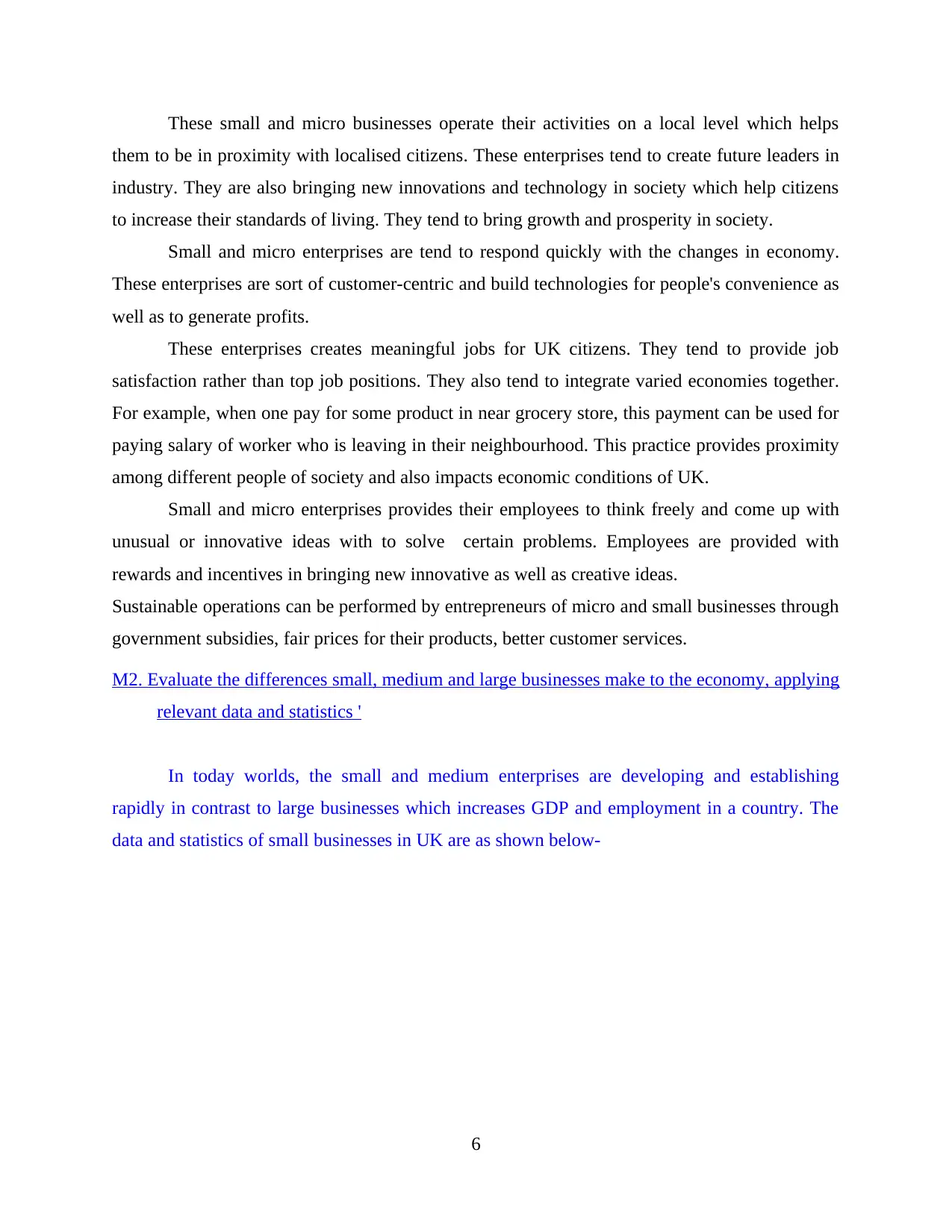
These small and micro businesses operate their activities on a local level which helps
them to be in proximity with localised citizens. These enterprises tend to create future leaders in
industry. They are also bringing new innovations and technology in society which help citizens
to increase their standards of living. They tend to bring growth and prosperity in society.
Small and micro enterprises are tend to respond quickly with the changes in economy.
These enterprises are sort of customer-centric and build technologies for people's convenience as
well as to generate profits.
These enterprises creates meaningful jobs for UK citizens. They tend to provide job
satisfaction rather than top job positions. They also tend to integrate varied economies together.
For example, when one pay for some product in near grocery store, this payment can be used for
paying salary of worker who is leaving in their neighbourhood. This practice provides proximity
among different people of society and also impacts economic conditions of UK.
Small and micro enterprises provides their employees to think freely and come up with
unusual or innovative ideas with to solve certain problems. Employees are provided with
rewards and incentives in bringing new innovative as well as creative ideas.
Sustainable operations can be performed by entrepreneurs of micro and small businesses through
government subsidies, fair prices for their products, better customer services.
M2. Evaluate the differences small, medium and large businesses make to the economy, applying
relevant data and statistics '
In today worlds, the small and medium enterprises are developing and establishing
rapidly in contrast to large businesses which increases GDP and employment in a country. The
data and statistics of small businesses in UK are as shown below-
6
them to be in proximity with localised citizens. These enterprises tend to create future leaders in
industry. They are also bringing new innovations and technology in society which help citizens
to increase their standards of living. They tend to bring growth and prosperity in society.
Small and micro enterprises are tend to respond quickly with the changes in economy.
These enterprises are sort of customer-centric and build technologies for people's convenience as
well as to generate profits.
These enterprises creates meaningful jobs for UK citizens. They tend to provide job
satisfaction rather than top job positions. They also tend to integrate varied economies together.
For example, when one pay for some product in near grocery store, this payment can be used for
paying salary of worker who is leaving in their neighbourhood. This practice provides proximity
among different people of society and also impacts economic conditions of UK.
Small and micro enterprises provides their employees to think freely and come up with
unusual or innovative ideas with to solve certain problems. Employees are provided with
rewards and incentives in bringing new innovative as well as creative ideas.
Sustainable operations can be performed by entrepreneurs of micro and small businesses through
government subsidies, fair prices for their products, better customer services.
M2. Evaluate the differences small, medium and large businesses make to the economy, applying
relevant data and statistics '
In today worlds, the small and medium enterprises are developing and establishing
rapidly in contrast to large businesses which increases GDP and employment in a country. The
data and statistics of small businesses in UK are as shown below-
6
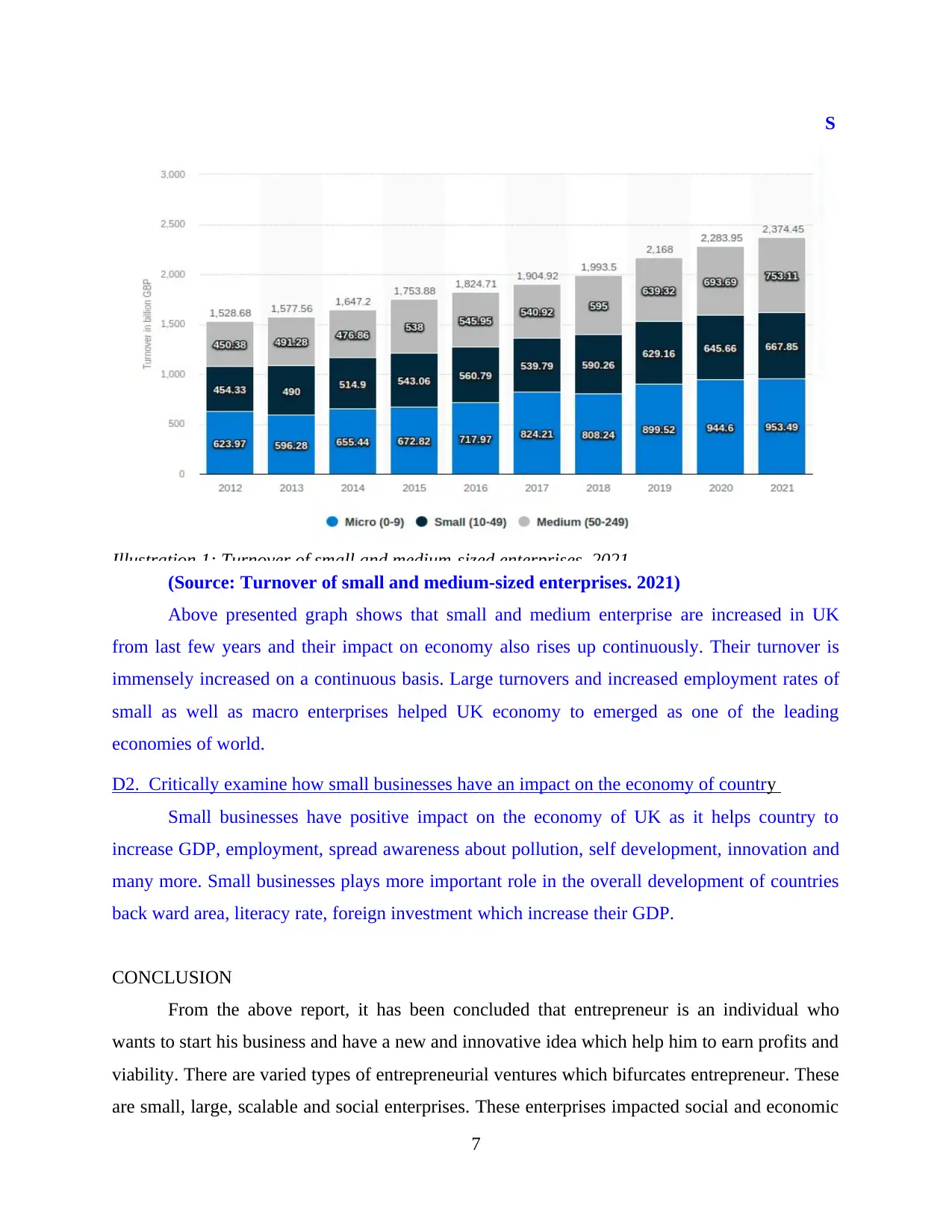
Illustration 1: Turnover of small and medium-sized enterprises. 2021
S
(Source: Turnover of small and medium-sized enterprises. 2021)
Above presented graph shows that small and medium enterprise are increased in UK
from last few years and their impact on economy also rises up continuously. Their turnover is
immensely increased on a continuous basis. Large turnovers and increased employment rates of
small as well as macro enterprises helped UK economy to emerged as one of the leading
economies of world.
D2. Critically examine how small businesses have an impact on the economy of country
Small businesses have positive impact on the economy of UK as it helps country to
increase GDP, employment, spread awareness about pollution, self development, innovation and
many more. Small businesses plays more important role in the overall development of countries
back ward area, literacy rate, foreign investment which increase their GDP.
CONCLUSION
From the above report, it has been concluded that entrepreneur is an individual who
wants to start his business and have a new and innovative idea which help him to earn profits and
viability. There are varied types of entrepreneurial ventures which bifurcates entrepreneur. These
are small, large, scalable and social enterprises. These enterprises impacted social and economic
7
S
(Source: Turnover of small and medium-sized enterprises. 2021)
Above presented graph shows that small and medium enterprise are increased in UK
from last few years and their impact on economy also rises up continuously. Their turnover is
immensely increased on a continuous basis. Large turnovers and increased employment rates of
small as well as macro enterprises helped UK economy to emerged as one of the leading
economies of world.
D2. Critically examine how small businesses have an impact on the economy of country
Small businesses have positive impact on the economy of UK as it helps country to
increase GDP, employment, spread awareness about pollution, self development, innovation and
many more. Small businesses plays more important role in the overall development of countries
back ward area, literacy rate, foreign investment which increase their GDP.
CONCLUSION
From the above report, it has been concluded that entrepreneur is an individual who
wants to start his business and have a new and innovative idea which help him to earn profits and
viability. There are varied types of entrepreneurial ventures which bifurcates entrepreneur. These
are small, large, scalable and social enterprises. These enterprises impacted social and economic
7
Paraphrase This Document
Need a fresh take? Get an instant paraphrase of this document with our AI Paraphraser
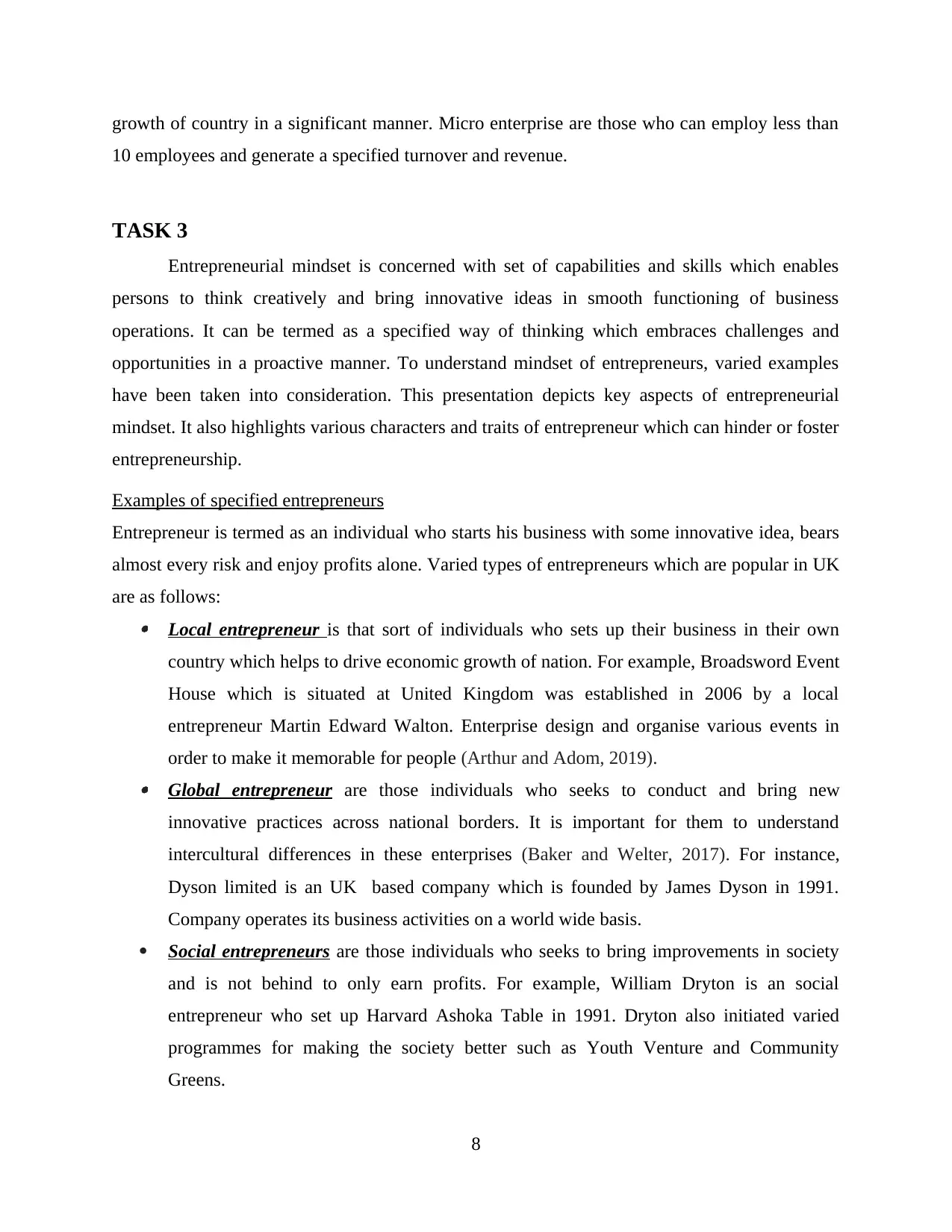
growth of country in a significant manner. Micro enterprise are those who can employ less than
10 employees and generate a specified turnover and revenue.
TASK 3
Entrepreneurial mindset is concerned with set of capabilities and skills which enables
persons to think creatively and bring innovative ideas in smooth functioning of business
operations. It can be termed as a specified way of thinking which embraces challenges and
opportunities in a proactive manner. To understand mindset of entrepreneurs, varied examples
have been taken into consideration. This presentation depicts key aspects of entrepreneurial
mindset. It also highlights various characters and traits of entrepreneur which can hinder or foster
entrepreneurship.
Examples of specified entrepreneurs
Entrepreneur is termed as an individual who starts his business with some innovative idea, bears
almost every risk and enjoy profits alone. Varied types of entrepreneurs which are popular in UK
are as follows: Local entrepreneur is that sort of individuals who sets up their business in their own
country which helps to drive economic growth of nation. For example, Broadsword Event
House which is situated at United Kingdom was established in 2006 by a local
entrepreneur Martin Edward Walton. Enterprise design and organise various events in
order to make it memorable for people (Arthur and Adom, 2019). Global entrepreneur are those individuals who seeks to conduct and bring new
innovative practices across national borders. It is important for them to understand
intercultural differences in these enterprises (Baker and Welter, 2017). For instance,
Dyson limited is an UK based company which is founded by James Dyson in 1991.
Company operates its business activities on a world wide basis.
Social entrepreneurs are those individuals who seeks to bring improvements in society
and is not behind to only earn profits. For example, William Dryton is an social
entrepreneur who set up Harvard Ashoka Table in 1991. Dryton also initiated varied
programmes for making the society better such as Youth Venture and Community
Greens.
8
10 employees and generate a specified turnover and revenue.
TASK 3
Entrepreneurial mindset is concerned with set of capabilities and skills which enables
persons to think creatively and bring innovative ideas in smooth functioning of business
operations. It can be termed as a specified way of thinking which embraces challenges and
opportunities in a proactive manner. To understand mindset of entrepreneurs, varied examples
have been taken into consideration. This presentation depicts key aspects of entrepreneurial
mindset. It also highlights various characters and traits of entrepreneur which can hinder or foster
entrepreneurship.
Examples of specified entrepreneurs
Entrepreneur is termed as an individual who starts his business with some innovative idea, bears
almost every risk and enjoy profits alone. Varied types of entrepreneurs which are popular in UK
are as follows: Local entrepreneur is that sort of individuals who sets up their business in their own
country which helps to drive economic growth of nation. For example, Broadsword Event
House which is situated at United Kingdom was established in 2006 by a local
entrepreneur Martin Edward Walton. Enterprise design and organise various events in
order to make it memorable for people (Arthur and Adom, 2019). Global entrepreneur are those individuals who seeks to conduct and bring new
innovative practices across national borders. It is important for them to understand
intercultural differences in these enterprises (Baker and Welter, 2017). For instance,
Dyson limited is an UK based company which is founded by James Dyson in 1991.
Company operates its business activities on a world wide basis.
Social entrepreneurs are those individuals who seeks to bring improvements in society
and is not behind to only earn profits. For example, William Dryton is an social
entrepreneur who set up Harvard Ashoka Table in 1991. Dryton also initiated varied
programmes for making the society better such as Youth Venture and Community
Greens.
8
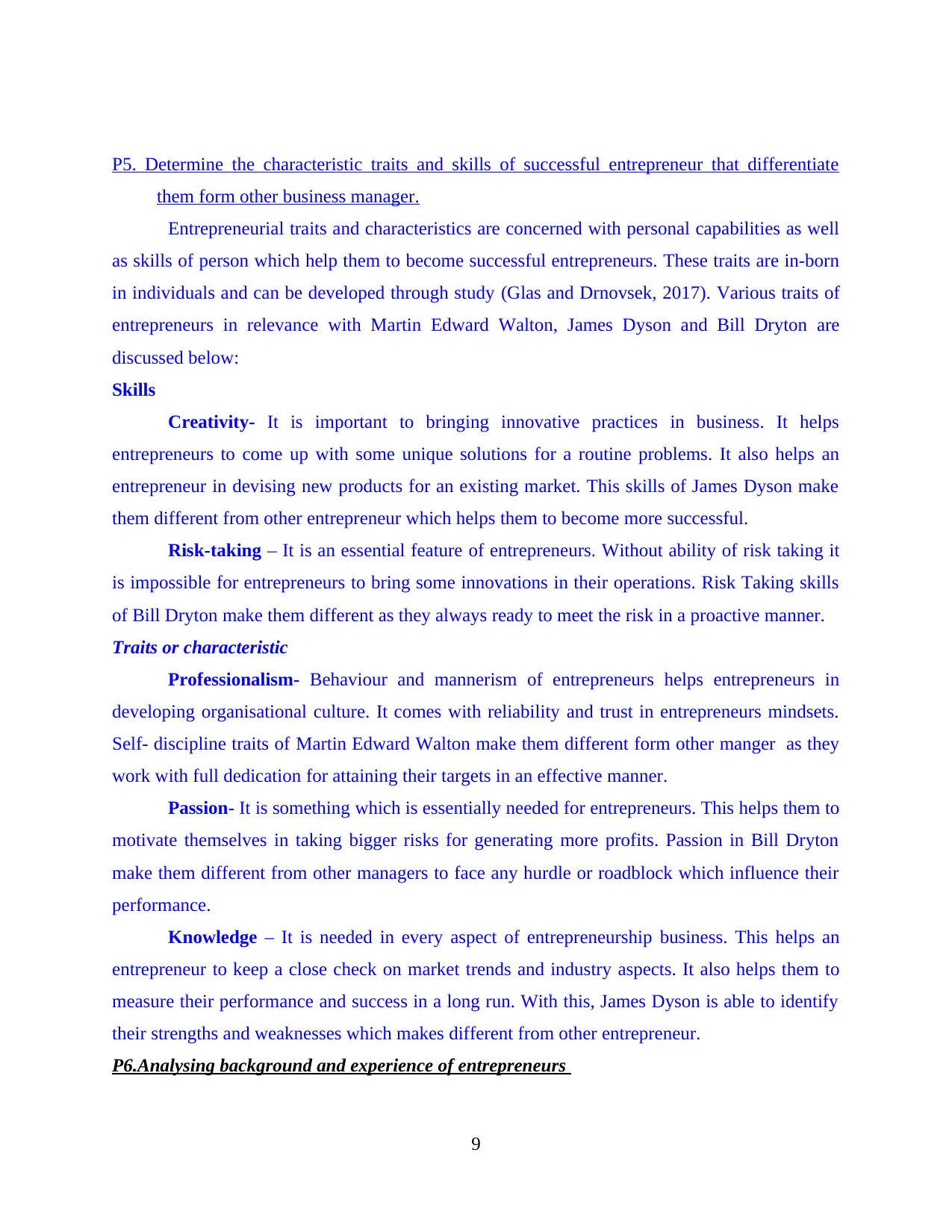
P5. Determine the characteristic traits and skills of successful entrepreneur that differentiate
them form other business manager.
Entrepreneurial traits and characteristics are concerned with personal capabilities as well
as skills of person which help them to become successful entrepreneurs. These traits are in-born
in individuals and can be developed through study (Glas and Drnovsek, 2017). Various traits of
entrepreneurs in relevance with Martin Edward Walton, James Dyson and Bill Dryton are
discussed below:
Skills
Creativity- It is important to bringing innovative practices in business. It helps
entrepreneurs to come up with some unique solutions for a routine problems. It also helps an
entrepreneur in devising new products for an existing market. This skills of James Dyson make
them different from other entrepreneur which helps them to become more successful.
Risk-taking – It is an essential feature of entrepreneurs. Without ability of risk taking it
is impossible for entrepreneurs to bring some innovations in their operations. Risk Taking skills
of Bill Dryton make them different as they always ready to meet the risk in a proactive manner.
Traits or characteristic
Professionalism- Behaviour and mannerism of entrepreneurs helps entrepreneurs in
developing organisational culture. It comes with reliability and trust in entrepreneurs mindsets.
Self- discipline traits of Martin Edward Walton make them different form other manger as they
work with full dedication for attaining their targets in an effective manner.
Passion- It is something which is essentially needed for entrepreneurs. This helps them to
motivate themselves in taking bigger risks for generating more profits. Passion in Bill Dryton
make them different from other managers to face any hurdle or roadblock which influence their
performance.
Knowledge – It is needed in every aspect of entrepreneurship business. This helps an
entrepreneur to keep a close check on market trends and industry aspects. It also helps them to
measure their performance and success in a long run. With this, James Dyson is able to identify
their strengths and weaknesses which makes different from other entrepreneur.
P6.Analysing background and experience of entrepreneurs
9
them form other business manager.
Entrepreneurial traits and characteristics are concerned with personal capabilities as well
as skills of person which help them to become successful entrepreneurs. These traits are in-born
in individuals and can be developed through study (Glas and Drnovsek, 2017). Various traits of
entrepreneurs in relevance with Martin Edward Walton, James Dyson and Bill Dryton are
discussed below:
Skills
Creativity- It is important to bringing innovative practices in business. It helps
entrepreneurs to come up with some unique solutions for a routine problems. It also helps an
entrepreneur in devising new products for an existing market. This skills of James Dyson make
them different from other entrepreneur which helps them to become more successful.
Risk-taking – It is an essential feature of entrepreneurs. Without ability of risk taking it
is impossible for entrepreneurs to bring some innovations in their operations. Risk Taking skills
of Bill Dryton make them different as they always ready to meet the risk in a proactive manner.
Traits or characteristic
Professionalism- Behaviour and mannerism of entrepreneurs helps entrepreneurs in
developing organisational culture. It comes with reliability and trust in entrepreneurs mindsets.
Self- discipline traits of Martin Edward Walton make them different form other manger as they
work with full dedication for attaining their targets in an effective manner.
Passion- It is something which is essentially needed for entrepreneurs. This helps them to
motivate themselves in taking bigger risks for generating more profits. Passion in Bill Dryton
make them different from other managers to face any hurdle or roadblock which influence their
performance.
Knowledge – It is needed in every aspect of entrepreneurship business. This helps an
entrepreneur to keep a close check on market trends and industry aspects. It also helps them to
measure their performance and success in a long run. With this, James Dyson is able to identify
their strengths and weaknesses which makes different from other entrepreneur.
P6.Analysing background and experience of entrepreneurs
9
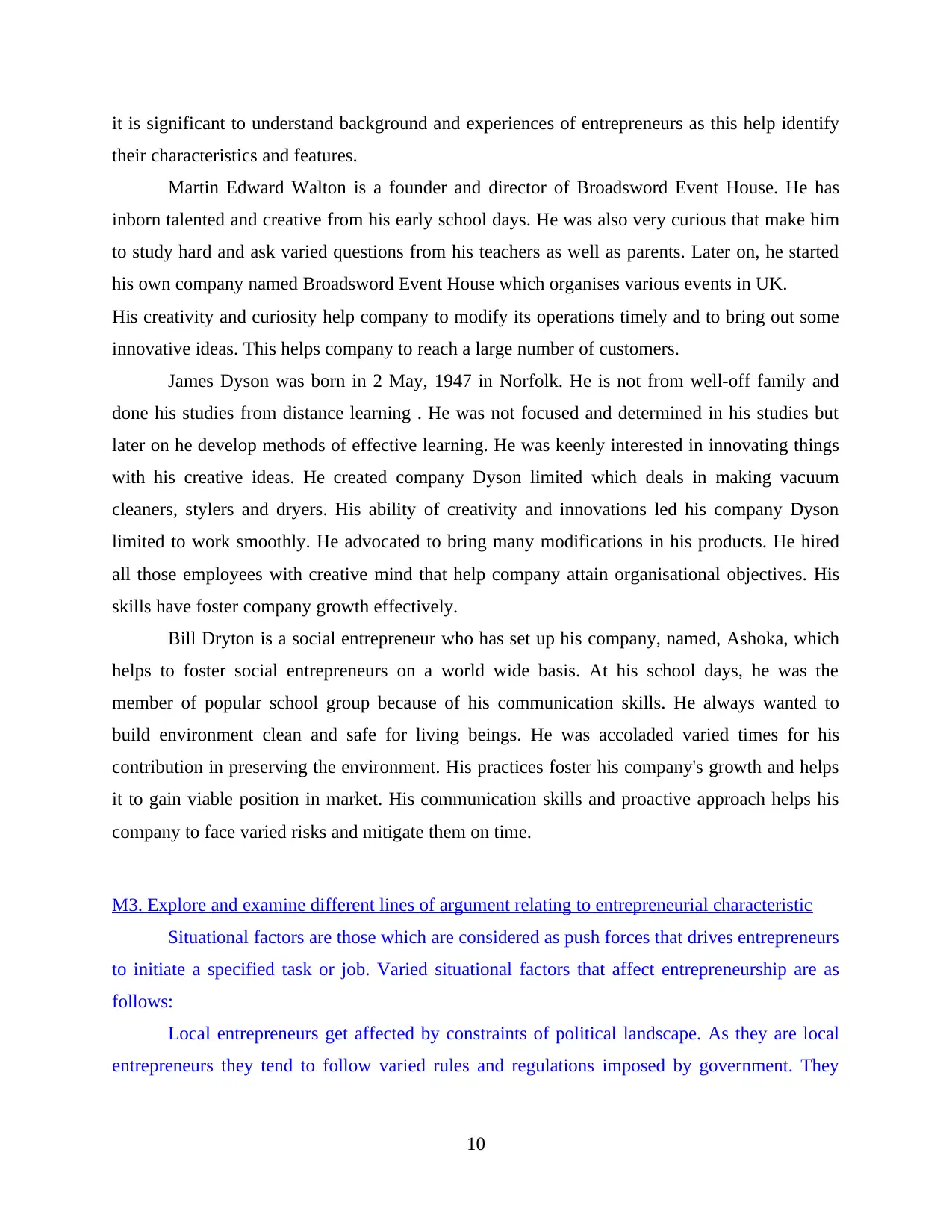
it is significant to understand background and experiences of entrepreneurs as this help identify
their characteristics and features.
Martin Edward Walton is a founder and director of Broadsword Event House. He has
inborn talented and creative from his early school days. He was also very curious that make him
to study hard and ask varied questions from his teachers as well as parents. Later on, he started
his own company named Broadsword Event House which organises various events in UK.
His creativity and curiosity help company to modify its operations timely and to bring out some
innovative ideas. This helps company to reach a large number of customers.
James Dyson was born in 2 May, 1947 in Norfolk. He is not from well-off family and
done his studies from distance learning . He was not focused and determined in his studies but
later on he develop methods of effective learning. He was keenly interested in innovating things
with his creative ideas. He created company Dyson limited which deals in making vacuum
cleaners, stylers and dryers. His ability of creativity and innovations led his company Dyson
limited to work smoothly. He advocated to bring many modifications in his products. He hired
all those employees with creative mind that help company attain organisational objectives. His
skills have foster company growth effectively.
Bill Dryton is a social entrepreneur who has set up his company, named, Ashoka, which
helps to foster social entrepreneurs on a world wide basis. At his school days, he was the
member of popular school group because of his communication skills. He always wanted to
build environment clean and safe for living beings. He was accoladed varied times for his
contribution in preserving the environment. His practices foster his company's growth and helps
it to gain viable position in market. His communication skills and proactive approach helps his
company to face varied risks and mitigate them on time.
M3. Explore and examine different lines of argument relating to entrepreneurial characteristic
Situational factors are those which are considered as push forces that drives entrepreneurs
to initiate a specified task or job. Varied situational factors that affect entrepreneurship are as
follows:
Local entrepreneurs get affected by constraints of political landscape. As they are local
entrepreneurs they tend to follow varied rules and regulations imposed by government. They
10
their characteristics and features.
Martin Edward Walton is a founder and director of Broadsword Event House. He has
inborn talented and creative from his early school days. He was also very curious that make him
to study hard and ask varied questions from his teachers as well as parents. Later on, he started
his own company named Broadsword Event House which organises various events in UK.
His creativity and curiosity help company to modify its operations timely and to bring out some
innovative ideas. This helps company to reach a large number of customers.
James Dyson was born in 2 May, 1947 in Norfolk. He is not from well-off family and
done his studies from distance learning . He was not focused and determined in his studies but
later on he develop methods of effective learning. He was keenly interested in innovating things
with his creative ideas. He created company Dyson limited which deals in making vacuum
cleaners, stylers and dryers. His ability of creativity and innovations led his company Dyson
limited to work smoothly. He advocated to bring many modifications in his products. He hired
all those employees with creative mind that help company attain organisational objectives. His
skills have foster company growth effectively.
Bill Dryton is a social entrepreneur who has set up his company, named, Ashoka, which
helps to foster social entrepreneurs on a world wide basis. At his school days, he was the
member of popular school group because of his communication skills. He always wanted to
build environment clean and safe for living beings. He was accoladed varied times for his
contribution in preserving the environment. His practices foster his company's growth and helps
it to gain viable position in market. His communication skills and proactive approach helps his
company to face varied risks and mitigate them on time.
M3. Explore and examine different lines of argument relating to entrepreneurial characteristic
Situational factors are those which are considered as push forces that drives entrepreneurs
to initiate a specified task or job. Varied situational factors that affect entrepreneurship are as
follows:
Local entrepreneurs get affected by constraints of political landscape. As they are local
entrepreneurs they tend to follow varied rules and regulations imposed by government. They
10
Secure Best Marks with AI Grader
Need help grading? Try our AI Grader for instant feedback on your assignments.
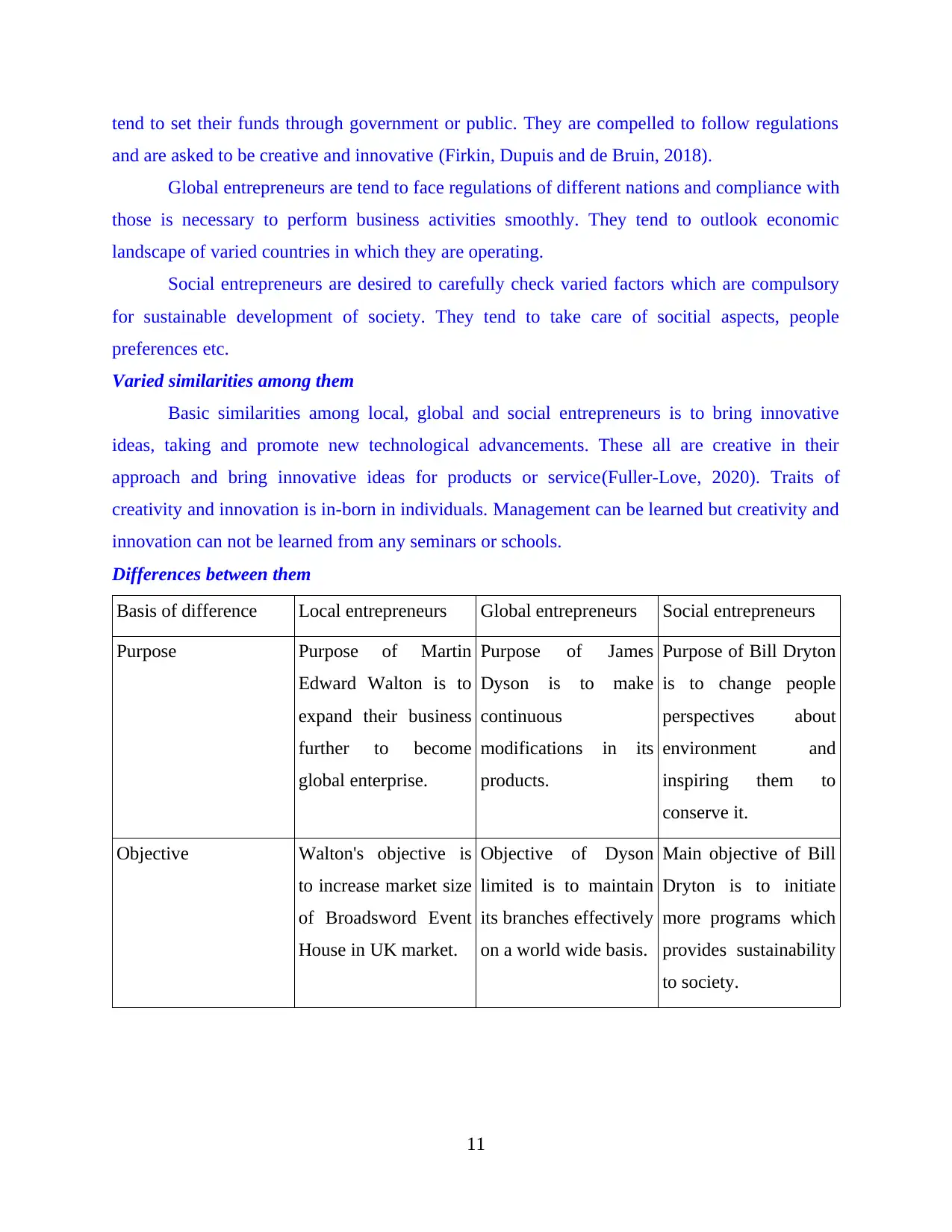
tend to set their funds through government or public. They are compelled to follow regulations
and are asked to be creative and innovative (Firkin, Dupuis and de Bruin, 2018).
Global entrepreneurs are tend to face regulations of different nations and compliance with
those is necessary to perform business activities smoothly. They tend to outlook economic
landscape of varied countries in which they are operating.
Social entrepreneurs are desired to carefully check varied factors which are compulsory
for sustainable development of society. They tend to take care of socitial aspects, people
preferences etc.
Varied similarities among them
Basic similarities among local, global and social entrepreneurs is to bring innovative
ideas, taking and promote new technological advancements. These all are creative in their
approach and bring innovative ideas for products or service(Fuller-Love, 2020). Traits of
creativity and innovation is in-born in individuals. Management can be learned but creativity and
innovation can not be learned from any seminars or schools.
Differences between them
Basis of difference Local entrepreneurs Global entrepreneurs Social entrepreneurs
Purpose Purpose of Martin
Edward Walton is to
expand their business
further to become
global enterprise.
Purpose of James
Dyson is to make
continuous
modifications in its
products.
Purpose of Bill Dryton
is to change people
perspectives about
environment and
inspiring them to
conserve it.
Objective Walton's objective is
to increase market size
of Broadsword Event
House in UK market.
Objective of Dyson
limited is to maintain
its branches effectively
on a world wide basis.
Main objective of Bill
Dryton is to initiate
more programs which
provides sustainability
to society.
11
and are asked to be creative and innovative (Firkin, Dupuis and de Bruin, 2018).
Global entrepreneurs are tend to face regulations of different nations and compliance with
those is necessary to perform business activities smoothly. They tend to outlook economic
landscape of varied countries in which they are operating.
Social entrepreneurs are desired to carefully check varied factors which are compulsory
for sustainable development of society. They tend to take care of socitial aspects, people
preferences etc.
Varied similarities among them
Basic similarities among local, global and social entrepreneurs is to bring innovative
ideas, taking and promote new technological advancements. These all are creative in their
approach and bring innovative ideas for products or service(Fuller-Love, 2020). Traits of
creativity and innovation is in-born in individuals. Management can be learned but creativity and
innovation can not be learned from any seminars or schools.
Differences between them
Basis of difference Local entrepreneurs Global entrepreneurs Social entrepreneurs
Purpose Purpose of Martin
Edward Walton is to
expand their business
further to become
global enterprise.
Purpose of James
Dyson is to make
continuous
modifications in its
products.
Purpose of Bill Dryton
is to change people
perspectives about
environment and
inspiring them to
conserve it.
Objective Walton's objective is
to increase market size
of Broadsword Event
House in UK market.
Objective of Dyson
limited is to maintain
its branches effectively
on a world wide basis.
Main objective of Bill
Dryton is to initiate
more programs which
provides sustainability
to society.
11
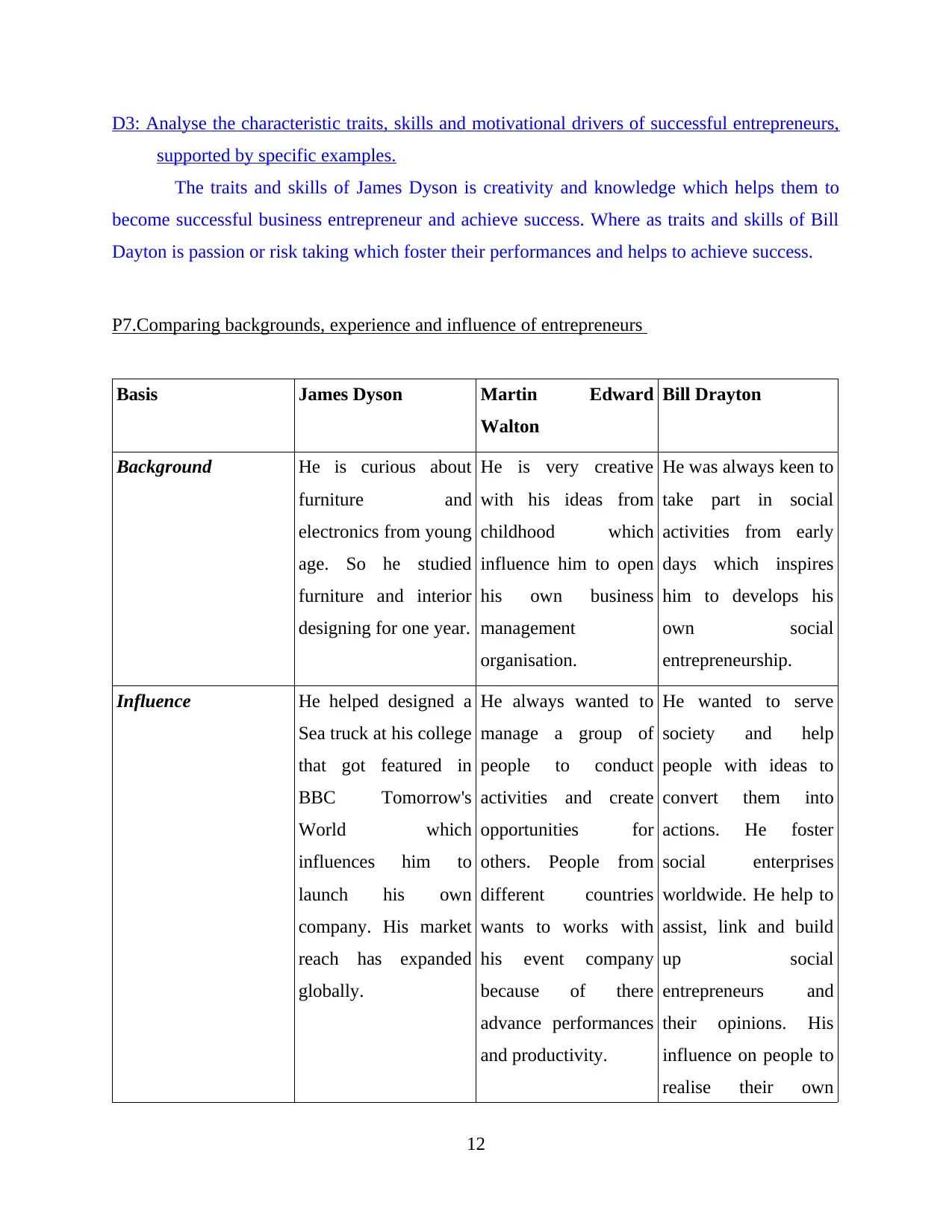
D3: Analyse the characteristic traits, skills and motivational drivers of successful entrepreneurs,
supported by specific examples.
The traits and skills of James Dyson is creativity and knowledge which helps them to
become successful business entrepreneur and achieve success. Where as traits and skills of Bill
Dayton is passion or risk taking which foster their performances and helps to achieve success.
P7.Comparing backgrounds, experience and influence of entrepreneurs
Basis James Dyson Martin Edward
Walton
Bill Drayton
Background He is curious about
furniture and
electronics from young
age. So he studied
furniture and interior
designing for one year.
He is very creative
with his ideas from
childhood which
influence him to open
his own business
management
organisation.
He was always keen to
take part in social
activities from early
days which inspires
him to develops his
own social
entrepreneurship.
Influence He helped designed a
Sea truck at his college
that got featured in
BBC Tomorrow's
World which
influences him to
launch his own
company. His market
reach has expanded
globally.
He always wanted to
manage a group of
people to conduct
activities and create
opportunities for
others. People from
different countries
wants to works with
his event company
because of there
advance performances
and productivity.
He wanted to serve
society and help
people with ideas to
convert them into
actions. He foster
social enterprises
worldwide. He help to
assist, link and build
up social
entrepreneurs and
their opinions. His
influence on people to
realise their own
12
supported by specific examples.
The traits and skills of James Dyson is creativity and knowledge which helps them to
become successful business entrepreneur and achieve success. Where as traits and skills of Bill
Dayton is passion or risk taking which foster their performances and helps to achieve success.
P7.Comparing backgrounds, experience and influence of entrepreneurs
Basis James Dyson Martin Edward
Walton
Bill Drayton
Background He is curious about
furniture and
electronics from young
age. So he studied
furniture and interior
designing for one year.
He is very creative
with his ideas from
childhood which
influence him to open
his own business
management
organisation.
He was always keen to
take part in social
activities from early
days which inspires
him to develops his
own social
entrepreneurship.
Influence He helped designed a
Sea truck at his college
that got featured in
BBC Tomorrow's
World which
influences him to
launch his own
company. His market
reach has expanded
globally.
He always wanted to
manage a group of
people to conduct
activities and create
opportunities for
others. People from
different countries
wants to works with
his event company
because of there
advance performances
and productivity.
He wanted to serve
society and help
people with ideas to
convert them into
actions. He foster
social enterprises
worldwide. He help to
assist, link and build
up social
entrepreneurs and
their opinions. His
influence on people to
realise their own
12
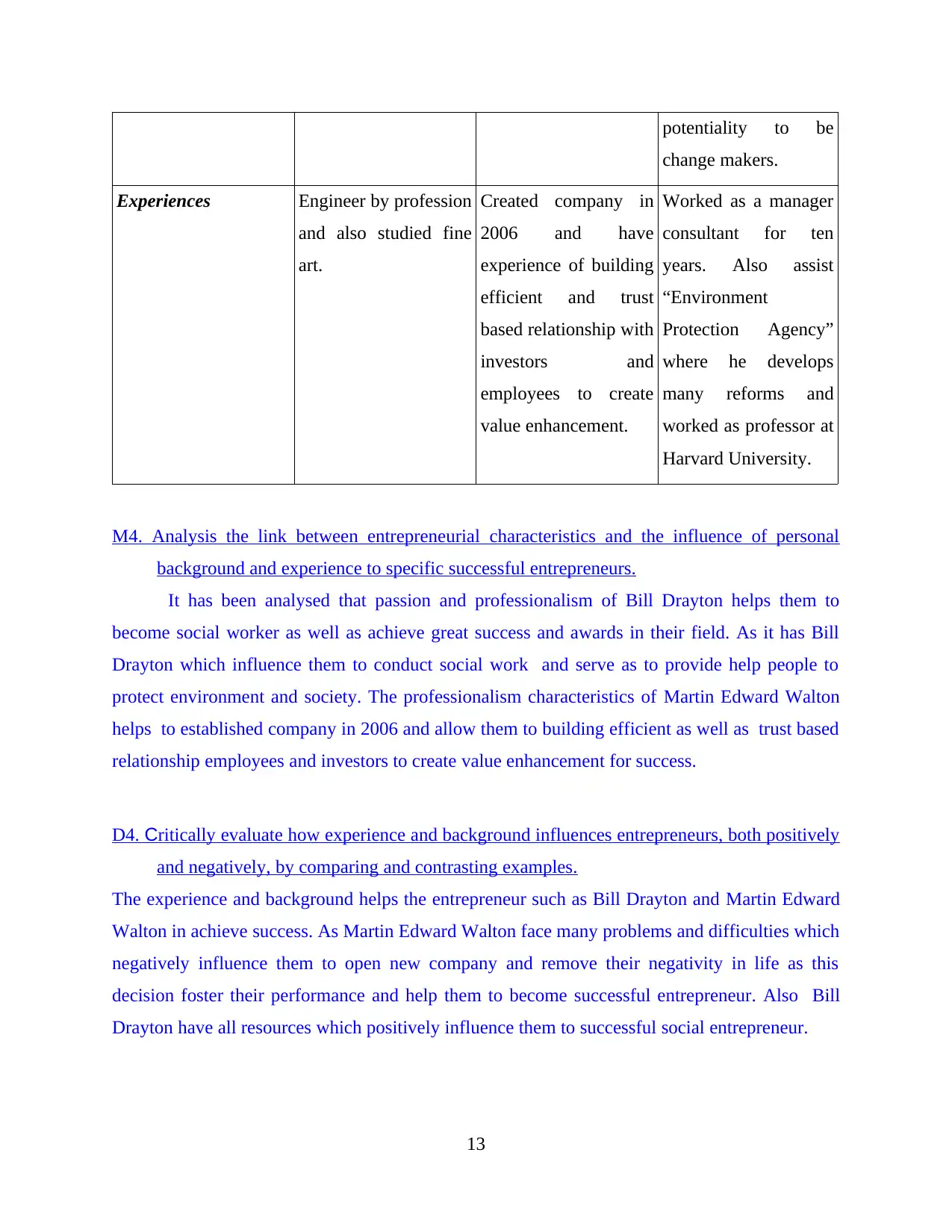
potentiality to be
change makers.
Experiences Engineer by profession
and also studied fine
art.
Created company in
2006 and have
experience of building
efficient and trust
based relationship with
investors and
employees to create
value enhancement.
Worked as a manager
consultant for ten
years. Also assist
“Environment
Protection Agency”
where he develops
many reforms and
worked as professor at
Harvard University.
M4. Analysis the link between entrepreneurial characteristics and the influence of personal
background and experience to specific successful entrepreneurs.
It has been analysed that passion and professionalism of Bill Drayton helps them to
become social worker as well as achieve great success and awards in their field. As it has Bill
Drayton which influence them to conduct social work and serve as to provide help people to
protect environment and society. The professionalism characteristics of Martin Edward Walton
helps to established company in 2006 and allow them to building efficient as well as trust based
relationship employees and investors to create value enhancement for success.
D4. Critically evaluate how experience and background influences entrepreneurs, both positively
and negatively, by comparing and contrasting examples.
The experience and background helps the entrepreneur such as Bill Drayton and Martin Edward
Walton in achieve success. As Martin Edward Walton face many problems and difficulties which
negatively influence them to open new company and remove their negativity in life as this
decision foster their performance and help them to become successful entrepreneur. Also Bill
Drayton have all resources which positively influence them to successful social entrepreneur.
13
change makers.
Experiences Engineer by profession
and also studied fine
art.
Created company in
2006 and have
experience of building
efficient and trust
based relationship with
investors and
employees to create
value enhancement.
Worked as a manager
consultant for ten
years. Also assist
“Environment
Protection Agency”
where he develops
many reforms and
worked as professor at
Harvard University.
M4. Analysis the link between entrepreneurial characteristics and the influence of personal
background and experience to specific successful entrepreneurs.
It has been analysed that passion and professionalism of Bill Drayton helps them to
become social worker as well as achieve great success and awards in their field. As it has Bill
Drayton which influence them to conduct social work and serve as to provide help people to
protect environment and society. The professionalism characteristics of Martin Edward Walton
helps to established company in 2006 and allow them to building efficient as well as trust based
relationship employees and investors to create value enhancement for success.
D4. Critically evaluate how experience and background influences entrepreneurs, both positively
and negatively, by comparing and contrasting examples.
The experience and background helps the entrepreneur such as Bill Drayton and Martin Edward
Walton in achieve success. As Martin Edward Walton face many problems and difficulties which
negatively influence them to open new company and remove their negativity in life as this
decision foster their performance and help them to become successful entrepreneur. Also Bill
Drayton have all resources which positively influence them to successful social entrepreneur.
13
Paraphrase This Document
Need a fresh take? Get an instant paraphrase of this document with our AI Paraphraser
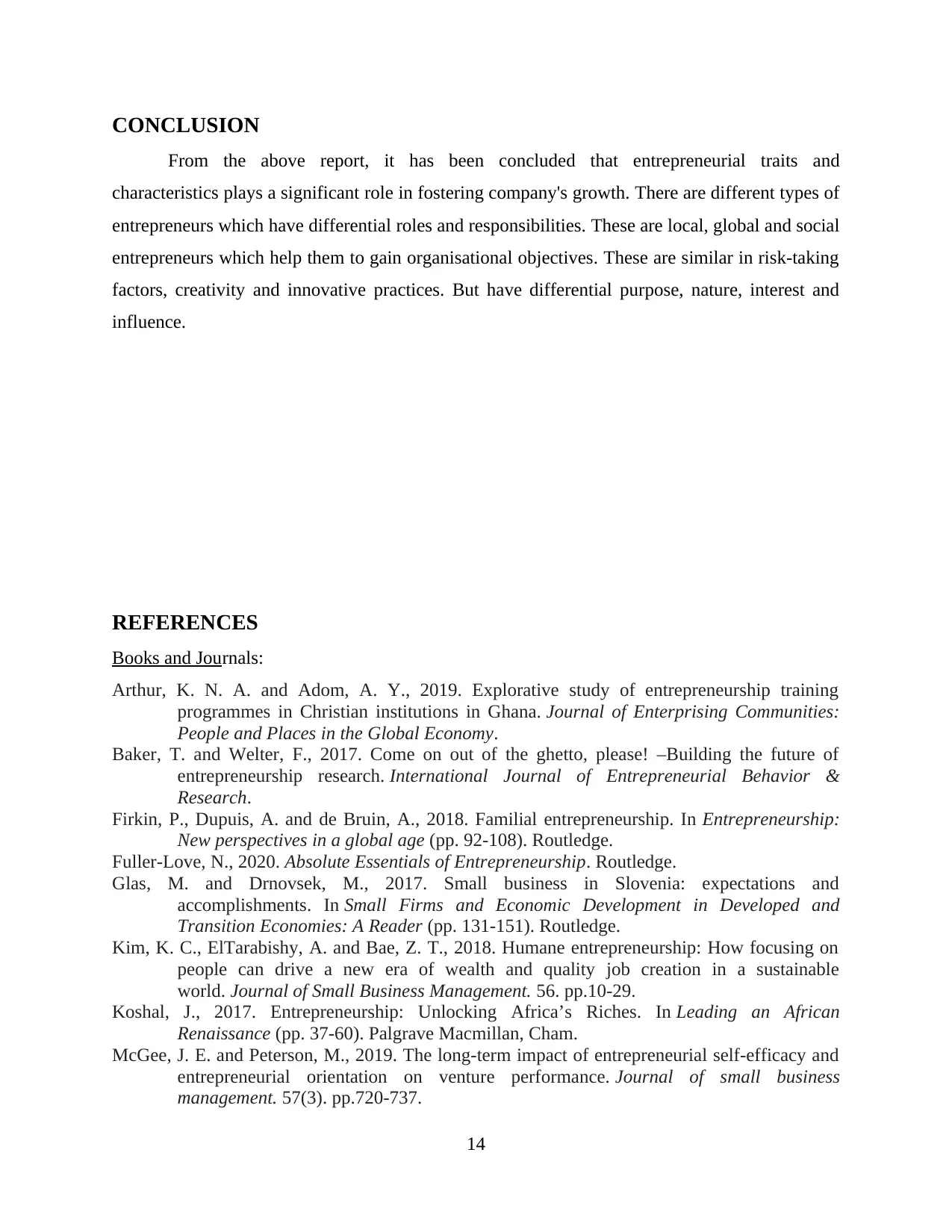
CONCLUSION
From the above report, it has been concluded that entrepreneurial traits and
characteristics plays a significant role in fostering company's growth. There are different types of
entrepreneurs which have differential roles and responsibilities. These are local, global and social
entrepreneurs which help them to gain organisational objectives. These are similar in risk-taking
factors, creativity and innovative practices. But have differential purpose, nature, interest and
influence.
REFERENCES
Books and Journals:
Arthur, K. N. A. and Adom, A. Y., 2019. Explorative study of entrepreneurship training
programmes in Christian institutions in Ghana. Journal of Enterprising Communities:
People and Places in the Global Economy.
Baker, T. and Welter, F., 2017. Come on out of the ghetto, please! –Building the future of
entrepreneurship research. International Journal of Entrepreneurial Behavior &
Research.
Firkin, P., Dupuis, A. and de Bruin, A., 2018. Familial entrepreneurship. In Entrepreneurship:
New perspectives in a global age (pp. 92-108). Routledge.
Fuller-Love, N., 2020. Absolute Essentials of Entrepreneurship. Routledge.
Glas, M. and Drnovsek, M., 2017. Small business in Slovenia: expectations and
accomplishments. In Small Firms and Economic Development in Developed and
Transition Economies: A Reader (pp. 131-151). Routledge.
Kim, K. C., ElTarabishy, A. and Bae, Z. T., 2018. Humane entrepreneurship: How focusing on
people can drive a new era of wealth and quality job creation in a sustainable
world. Journal of Small Business Management. 56. pp.10-29.
Koshal, J., 2017. Entrepreneurship: Unlocking Africa’s Riches. In Leading an African
Renaissance (pp. 37-60). Palgrave Macmillan, Cham.
McGee, J. E. and Peterson, M., 2019. The long‐term impact of entrepreneurial self‐efficacy and
entrepreneurial orientation on venture performance. Journal of small business
management. 57(3). pp.720-737.
14
From the above report, it has been concluded that entrepreneurial traits and
characteristics plays a significant role in fostering company's growth. There are different types of
entrepreneurs which have differential roles and responsibilities. These are local, global and social
entrepreneurs which help them to gain organisational objectives. These are similar in risk-taking
factors, creativity and innovative practices. But have differential purpose, nature, interest and
influence.
REFERENCES
Books and Journals:
Arthur, K. N. A. and Adom, A. Y., 2019. Explorative study of entrepreneurship training
programmes in Christian institutions in Ghana. Journal of Enterprising Communities:
People and Places in the Global Economy.
Baker, T. and Welter, F., 2017. Come on out of the ghetto, please! –Building the future of
entrepreneurship research. International Journal of Entrepreneurial Behavior &
Research.
Firkin, P., Dupuis, A. and de Bruin, A., 2018. Familial entrepreneurship. In Entrepreneurship:
New perspectives in a global age (pp. 92-108). Routledge.
Fuller-Love, N., 2020. Absolute Essentials of Entrepreneurship. Routledge.
Glas, M. and Drnovsek, M., 2017. Small business in Slovenia: expectations and
accomplishments. In Small Firms and Economic Development in Developed and
Transition Economies: A Reader (pp. 131-151). Routledge.
Kim, K. C., ElTarabishy, A. and Bae, Z. T., 2018. Humane entrepreneurship: How focusing on
people can drive a new era of wealth and quality job creation in a sustainable
world. Journal of Small Business Management. 56. pp.10-29.
Koshal, J., 2017. Entrepreneurship: Unlocking Africa’s Riches. In Leading an African
Renaissance (pp. 37-60). Palgrave Macmillan, Cham.
McGee, J. E. and Peterson, M., 2019. The long‐term impact of entrepreneurial self‐efficacy and
entrepreneurial orientation on venture performance. Journal of small business
management. 57(3). pp.720-737.
14
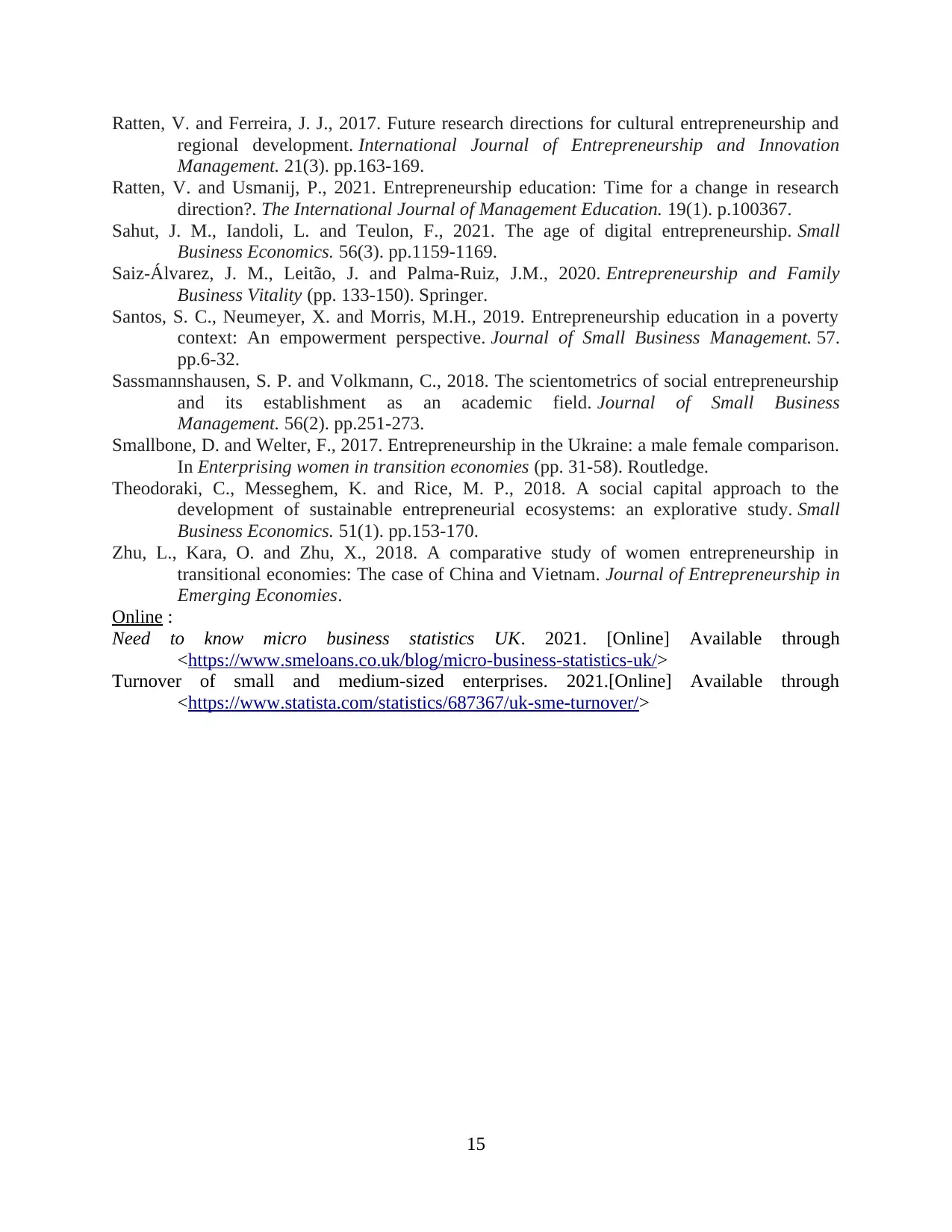
Ratten, V. and Ferreira, J. J., 2017. Future research directions for cultural entrepreneurship and
regional development. International Journal of Entrepreneurship and Innovation
Management. 21(3). pp.163-169.
Ratten, V. and Usmanij, P., 2021. Entrepreneurship education: Time for a change in research
direction?. The International Journal of Management Education. 19(1). p.100367.
Sahut, J. M., Iandoli, L. and Teulon, F., 2021. The age of digital entrepreneurship. Small
Business Economics. 56(3). pp.1159-1169.
Saiz-Álvarez, J. M., Leitão, J. and Palma-Ruiz, J.M., 2020. Entrepreneurship and Family
Business Vitality (pp. 133-150). Springer.
Santos, S. C., Neumeyer, X. and Morris, M.H., 2019. Entrepreneurship education in a poverty
context: An empowerment perspective. Journal of Small Business Management. 57.
pp.6-32.
Sassmannshausen, S. P. and Volkmann, C., 2018. The scientometrics of social entrepreneurship
and its establishment as an academic field. Journal of Small Business
Management. 56(2). pp.251-273.
Smallbone, D. and Welter, F., 2017. Entrepreneurship in the Ukraine: a male female comparison.
In Enterprising women in transition economies (pp. 31-58). Routledge.
Theodoraki, C., Messeghem, K. and Rice, M. P., 2018. A social capital approach to the
development of sustainable entrepreneurial ecosystems: an explorative study. Small
Business Economics. 51(1). pp.153-170.
Zhu, L., Kara, O. and Zhu, X., 2018. A comparative study of women entrepreneurship in
transitional economies: The case of China and Vietnam. Journal of Entrepreneurship in
Emerging Economies.
Online :
Need to know micro business statistics UK. 2021. [Online] Available through
<https://www.smeloans.co.uk/blog/micro-business-statistics-uk/>
Turnover of small and medium-sized enterprises. 2021.[Online] Available through
<https://www.statista.com/statistics/687367/uk-sme-turnover/>
15
regional development. International Journal of Entrepreneurship and Innovation
Management. 21(3). pp.163-169.
Ratten, V. and Usmanij, P., 2021. Entrepreneurship education: Time for a change in research
direction?. The International Journal of Management Education. 19(1). p.100367.
Sahut, J. M., Iandoli, L. and Teulon, F., 2021. The age of digital entrepreneurship. Small
Business Economics. 56(3). pp.1159-1169.
Saiz-Álvarez, J. M., Leitão, J. and Palma-Ruiz, J.M., 2020. Entrepreneurship and Family
Business Vitality (pp. 133-150). Springer.
Santos, S. C., Neumeyer, X. and Morris, M.H., 2019. Entrepreneurship education in a poverty
context: An empowerment perspective. Journal of Small Business Management. 57.
pp.6-32.
Sassmannshausen, S. P. and Volkmann, C., 2018. The scientometrics of social entrepreneurship
and its establishment as an academic field. Journal of Small Business
Management. 56(2). pp.251-273.
Smallbone, D. and Welter, F., 2017. Entrepreneurship in the Ukraine: a male female comparison.
In Enterprising women in transition economies (pp. 31-58). Routledge.
Theodoraki, C., Messeghem, K. and Rice, M. P., 2018. A social capital approach to the
development of sustainable entrepreneurial ecosystems: an explorative study. Small
Business Economics. 51(1). pp.153-170.
Zhu, L., Kara, O. and Zhu, X., 2018. A comparative study of women entrepreneurship in
transitional economies: The case of China and Vietnam. Journal of Entrepreneurship in
Emerging Economies.
Online :
Need to know micro business statistics UK. 2021. [Online] Available through
<https://www.smeloans.co.uk/blog/micro-business-statistics-uk/>
Turnover of small and medium-sized enterprises. 2021.[Online] Available through
<https://www.statista.com/statistics/687367/uk-sme-turnover/>
15
1 out of 18
Related Documents
Your All-in-One AI-Powered Toolkit for Academic Success.
+13062052269
info@desklib.com
Available 24*7 on WhatsApp / Email
![[object Object]](/_next/static/media/star-bottom.7253800d.svg)
Unlock your academic potential
© 2024 | Zucol Services PVT LTD | All rights reserved.





